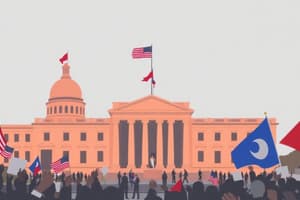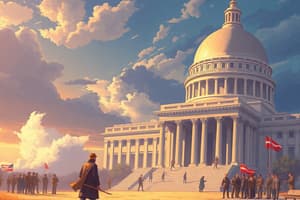Podcast
Questions and Answers
What is meant by the term 'democracy'?
What is meant by the term 'democracy'?
- A political system where power is inherited
- Government of, by, and for the people (correct)
- An economic system favoring private ownership
- A government controlled by a single leader
Which feature of democracy allows citizens to remove officials from power?
Which feature of democracy allows citizens to remove officials from power?
- Periodic elections (correct)
- Freedom of the press
- Secret ballot
- Political parties
What is one of the primary functions of the Independent National Electoral Commission (INEC)?
What is one of the primary functions of the Independent National Electoral Commission (INEC)?
- Provide financial aid to political parties
- Appoint government officials
- Conduct elections and announce results (correct)
- Draft the constitution
Which of the following best describes 'universal adult suffrage'?
Which of the following best describes 'universal adult suffrage'?
Which concept ensures the constitution is the highest law in a democracy?
Which concept ensures the constitution is the highest law in a democracy?
What role do political parties play in a democracy?
What role do political parties play in a democracy?
Which pillar of democracy describes the power of the electorate?
Which pillar of democracy describes the power of the electorate?
How does democracy protect individual rights?
How does democracy protect individual rights?
What is the primary emphasis of democracy as defined in the principles outlined?
What is the primary emphasis of democracy as defined in the principles outlined?
Which of the following represents a type of citizenship that can be obtained through legal processes after immigration?
Which of the following represents a type of citizenship that can be obtained through legal processes after immigration?
What was a key reason for the formation of a federation as outlined?
What was a key reason for the formation of a federation as outlined?
Which constitution was established in Nigeria first?
Which constitution was established in Nigeria first?
What is an example of direct elections?
What is an example of direct elections?
Which security agency in Nigeria focuses primarily on internal security and intelligence gathering?
Which security agency in Nigeria focuses primarily on internal security and intelligence gathering?
What best describes the concept of national security?
What best describes the concept of national security?
Which of the following is NOT a duty of citizens in maintaining national security?
Which of the following is NOT a duty of citizens in maintaining national security?
Which of the following is a feature of modern democratic systems?
Which of the following is a feature of modern democratic systems?
In a unicameral legislative system, how many chambers does the legislature have?
In a unicameral legislative system, how many chambers does the legislature have?
What does the 'Concurrent List' refer to in the context of governance?
What does the 'Concurrent List' refer to in the context of governance?
What distinguishes a parliamentary system from other systems of government?
What distinguishes a parliamentary system from other systems of government?
Which system of democracy allows citizens to collectively make decisions?
Which system of democracy allows citizens to collectively make decisions?
Which arms of government is responsible for implementing laws?
Which arms of government is responsible for implementing laws?
How many local governments are there in Rivers State?
How many local governments are there in Rivers State?
Which of the following accurately describes the rule of law?
Which of the following accurately describes the rule of law?
Flashcards are hidden until you start studying
Study Notes
Democracy: A System of Government
- Democracy is government of, by and for the people.
Features of Democracy
- Franchise: Citizens have the right to vote and be voted for.
- Periodic Elections: Citizens can choose their leaders through regular elections.
- Separation of Powers: The government is divided into three branches: executive, legislative, and judiciary, each with specific roles.
- Political Parties: Multiple political parties compete for power, offering different visions and policies to voters.
- Secret Ballot: Voting is confidential, ensuring voters' freedom of choice.
- Universal Adult Suffrage: All adults have the right to vote, regardless of gender, race, or other factors.
- Freedom of the Press: Media can freely express views on political issues, holding the government accountable.
- Fundamental Human Rights: Basic rights of individuals are protected by law.
- Supremacy of the Constitution and Rule of Law: The constitution is the highest law of the land, guiding governance and ensuring that laws are enforced fairly.
Democratic Institutions
- Independent National Electoral Commission (INEC): The body responsible for organizing and conducting elections in Nigeria.
- Conducts voter registration, displays voter lists, and divides the country into constituencies.
- Organizes elections, provides voting materials, and announces results.
- Political Parties: Associations that aim to acquire political power.
- Train future politicians and connect the people to the government.
- Conduct primaries to select candidates and educate the public about political issues.
- Pressure Groups: Groups that influence government decisions without participating in partisan politics.
- Advise the government, promote members' interests, and act as watchdogs on public policies.
- Provide welfare services and educate members about their rights.
- Arms of Government: The executive, legislative, and judiciary branches form the structure of government.
Importance of Democracy
- Ensures equality of individuals and protection of rights.
- Operates under the rule of law, ensuring government actions comply with constitutional provisions.
- Allows free choice of leaders through elections, promoting tolerance for opposing views.
- Prevents the misuse of power through checks and balances between the branches of government.
Pillars of Democracy
- People: The voting public holds the ultimate power in a democracy.
- Democratic Institutions: Structures like INEC and the different branches of government are crucial for democratic functioning.
- Rule of Law: Ensures equality, personal liberty, and the supremacy of the law.
- Transparent Electoral Process: Fair and open elections conducted by INEC.
- Majority Rule: Elected officials represent the interests of the majority of voters.
- Minority Rights: Protects the rights of all citizens and minority groups.
Forms of Democracy
- Direct/Pure Democracy: Citizens directly make decisions.
- Representative Democracy: Citizens elect representatives to make decisions on their behalf.
- Constitutional Democracy: Government operates according to constitutional provisions.
Features of Modern Democratic Systems
- Freedom of the press and citizen liberties.
- Rule of Law.
- Majority rule based on electoral outcomes.
- Presence of political parties.
- Independence of the judiciary.
- Free and fair elections held periodically.
Systems of Government
- Unitary System: Power is centralized in the central government.
- Federal System: Power is shared between the central government and regional or state governments.
- Parliamentary System: The head of state is different from the head of government.
- Monarchial System: Ruled by a king or queen.
Structure of Government in Nigeria
- Consists of one federal government, 36 states, and 774 local governments.
- Each state has its own government, with varying numbers of local governments (e.g., Rivers State has 23 local governments).
Arms of Government
- Executive: Implements laws (e.g., the president and the cabinet).
- Legislative: Makes laws.
- Unicameralism: One legislative chamber (e.g., House of Assembly).
- Bicameralism: Two legislative chambers (e.g., Senate and House of Representatives).
- Senate: The upper legislative chamber, with 3 senators per state (total of 109).
- House of Representatives: The lower legislative chamber, with 10 representatives per state (total of 360).
- Judiciary: Interprets the law and punishes lawbreakers.
Legislative Lists
- Exclusive List: Powers exclusively held by the federal government (e.g., changing state boundaries, currency printing).
- Concurrent List: Powers shared between the federal and state governments.
Tiers of Government
- Federal, State, and Local governments are the tiers of government in Nigeria.
Symbols of Authority
- Legislative: Mace (a ceremonial staff) and Gavel.
- Executive: Flag, Anthem, and Coat of Arms.
- Judiciary: Wigs worn by judges and the symbol of Lady Justice.
Universal Declaration of Human Rights (UDHR)
- Established in 1948 by the United Nations.
- Nigeria adopted 20 out of the 30 outlined human rights.
Key Historical Constitutions in Nigeria
- Clifford Constitution (1922)
- Richard Constitution (1946)
- Macpherson Constitution (1951)
- Lyttleton Constitution (1954)
- Independence Constitution (1960)
Principles of Democracy
- Government of, by, and for the people, emphasizing the role of the electorate.
- Rule of Law: The supremacy of the law, ensuring that all individuals are equal before the law.
Types of Elections
- Direct Elections: Voters directly choose their representatives.
- Indirect Elections: Involve processes like the Electoral College.
National Security
- Protection of a nation's citizens, territory, and interests from external and internal threats.
Duties of Citizens to Maintain National Security
- Obey the Law.
- Report Suspicious Activities.
- Participate in National Service.
- Promote Peace.
- Stay Informed.
Citizenship
- The status of being a member of a nation or state, with associated rights and responsibilities.
Types of Citizenship
- Birthright Citizenship: Granted to individuals born within a country.
- Naturalized Citizenship: Conferred upon individuals who meet requirements after immigrating.
- Dual Citizenship: Holding citizenship in two different countries.
Reasons for Federation
- Diverse Interests: Accommodates different ethnic, cultural, and linguistic groups.
- Distribution of Power: Shares power between the central and regional governments.
- Economic Efficiency: Allows regions to focus on specific economic activities.
- Protection of Minorities: Safeguards the rights of minority groups.
Security Agencies and Date of Establishment
- Nigerian Police Force (NPF): Established in 1820; responsible for maintaining law and order.
- Nigerian Army: Established in 1960; responsible for land-based military operations.
- Nigerian Navy: Established in 1956; responsible for naval operations.
- Nigerian Air Force: Established in 1964; responsible for aerial military operations.
- Department of State Services (DSS): Established in 1986; focuses on internal security and intelligence gathering.
Constitutions and Types
- A constitution is a set of fundamental principles guiding a state's governance.
Types of Constitutions
- Written: Explicitly written document.
- Unwritten: Based on customs and precedents.
- Rigid: Difficult to amend, requiring significant processes.
- Flexible: Can be amended more easily.
Functions of Constitutions
- Define the structure of government and its powers.
- Establish fundamental rights and liberties.
- Provide a framework for governance.
- Serve as the supreme law of the land.
Studying That Suits You
Use AI to generate personalized quizzes and flashcards to suit your learning preferences.




